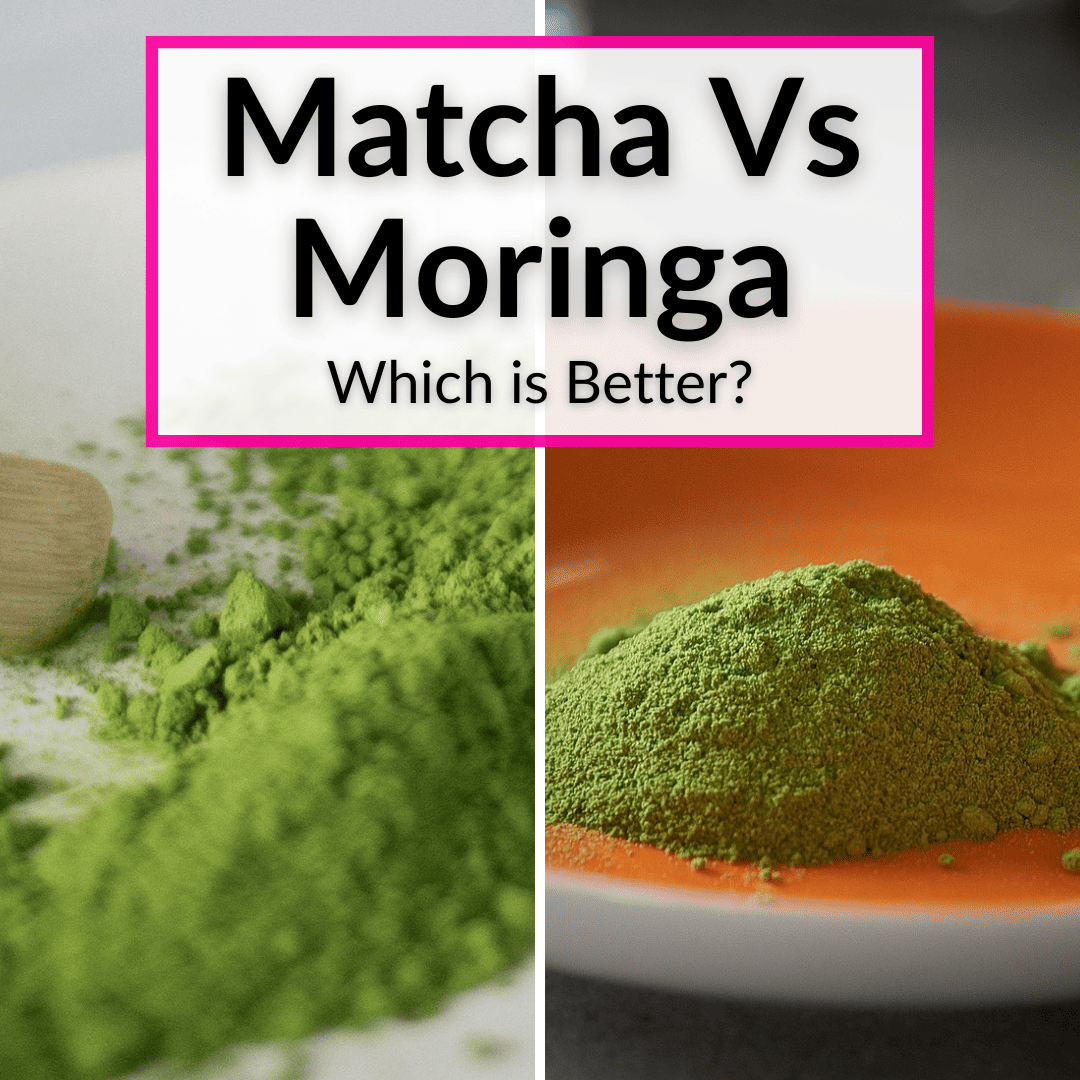 Readers often expect me to know everything about tea.
Readers often expect me to know everything about tea.
I don’t.
I know a lot and started this site to teach people about tea.
But sometimes my readers end up teaching me something new.
When someone recently asked me to compare matcha vs moringa, I had to admit I had never heard of moringa.
So I hired a writer who knows a lot about both drinks to write this comparison.
It worked. I definitely learned something. And I hope you do too.
As for which drink I prefer: still matcha. But I haven’t actually tried moringa yet. I will and we’ll see how I feel then. I will never stop drinking matcha, but perhaps I will make room for the occasional cup of moringa tea, too.
Table of Contents
Moringa Vs Matcha
We will begin this comparison of moringa vs matcha by looking at each tea individually, before comparing them directly. We’ll finish by discussing the reasons to drink each tea. In the end, I always recommend trying both and seeing which you like best.
Matcha
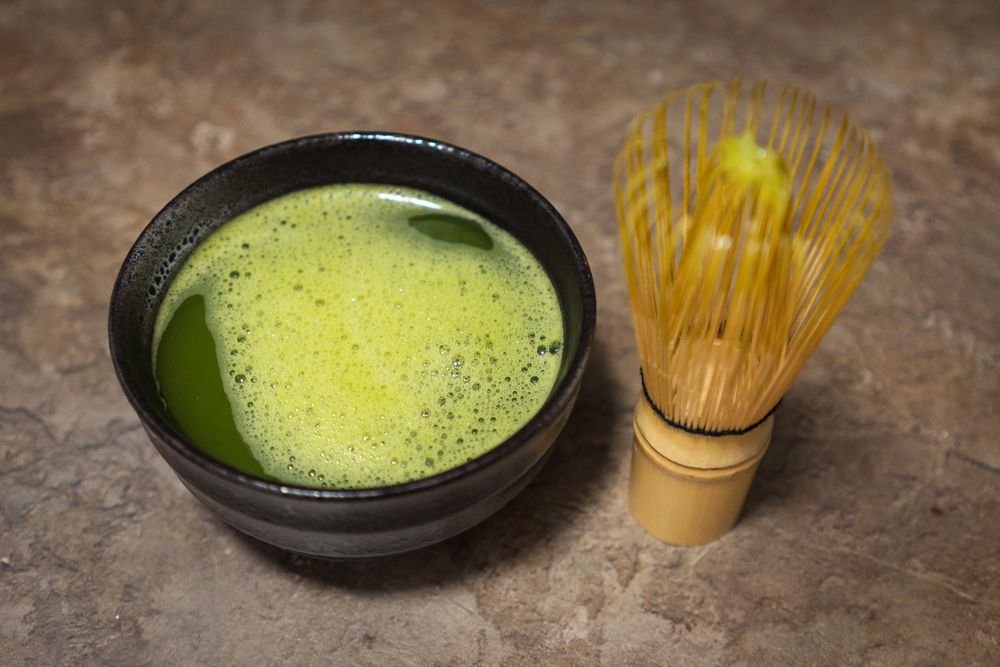
Matcha is a Japanese powdered green tea known as the ‘superhero among teas’. In Japan, it is consumed both as tea and as food. Its popularity is increasing around the globe, thanks to its natural antioxidant qualities.
Buddhist monks have used matcha tea for centuries to help them focus during meditation. Today, it is used to flavor cakes, ice creams, and chocolates.
It is often served in the form of ‘shots’ at parties and fashion shows. Experts believe that matcha might replace kale as the next superfood.
The green tea plant (Camelia sinensis) used for making matcha is grown in the shade. The leaves then undergo special processing after harvesting.
Processing includes steaming, cooling-drying, cutting-sorting, and milling. This method retains matcha’s antioxidants and also enhances its caffeine and theanine content.
The leaves are then ground into a powder. That powder is what you add to hot water to make the tea. As such, you are consuming the entire tea leaves, instead of just the essence as with other types of tea. This is why matcha has so many more health benefits. and also more caffeine.
Moringa
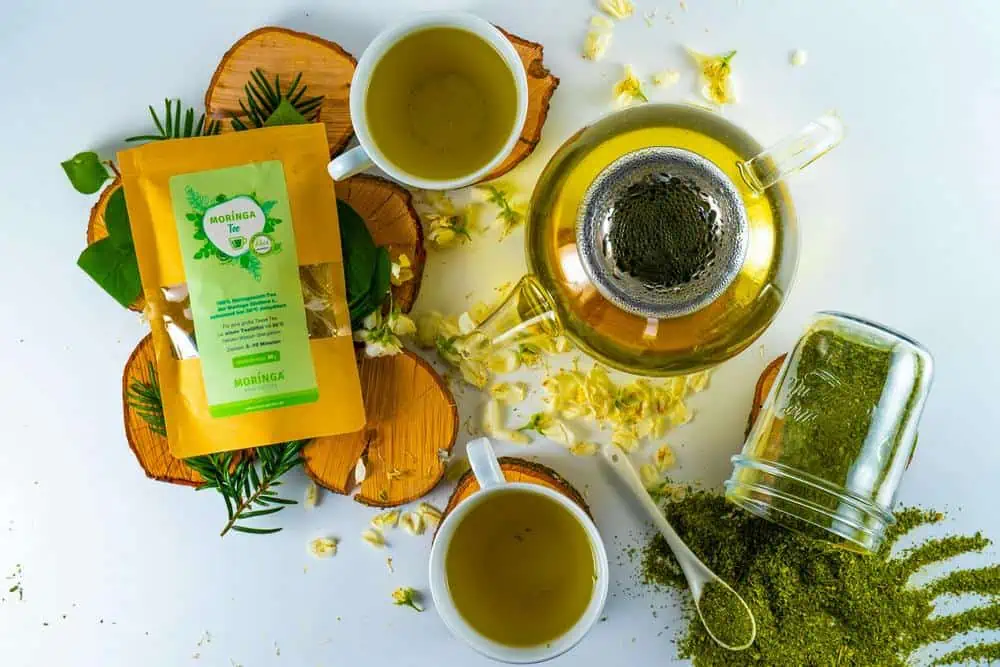
Moringa tea is made using the leaves of the moringa oleifera tree. The Moringa tree mainly grows in Asia and Africa (although it can easily withstand any climate). Indians have used moringa leaves and seeds for thousands of years for culinary and medicinal purposes.
Moringa is often called a supernatural tree and a mother’s best friend. It also goes by other names, like horseradish tree, drumstick tree, moonga, mlonge, etc.
All parts of moringa (seeds, drumsticks, and leaves) contain nutrients like vitamins, calcium, iron, and antioxidants (phenolic acid, carotenoids, and flavonoids). Preliminary studies have demonstrated moringa to be beneficial in reducing high cholesterol, hypertension, diabetes, non-alcoholic liver disease, and obesity.
Differences Between Matcha And Moringa
Matcha and moringa teas differ in a number of ways. Let’s take a look at the major differences between moringa and matcha.
Different Plants
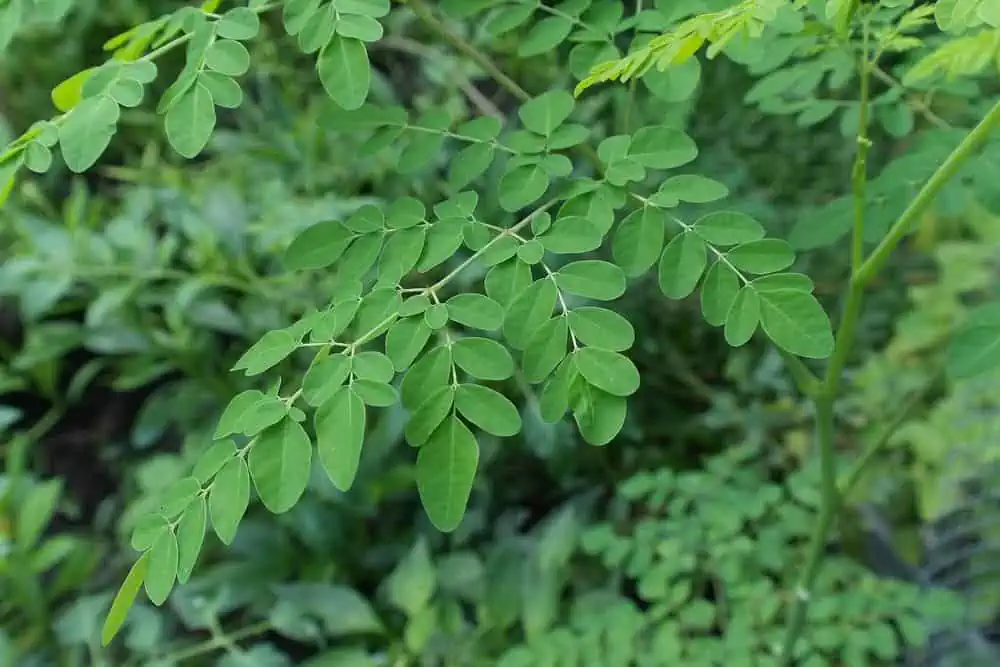
The main difference between matcha tea and moringa tea is that they come from different plants. Matcha tea is made from the Camelia sinensis plant, while moringa comes from the Moringa oleifera tree.
Matcha needs a special climate and harvesting techniques and is usually sourced from Japan or China. Moringa is a hardy tree that can grow in many climates. A majority of moringa is sourced from Africa and Asia.
Different Flavors
Matcha tea has an earthy, slightly bitter, or nutty taste. Some people describe matcha as ‘sweet’’ which is why it is used in desserts. Moringa tea has a sharp, bitter, and asparagus-like or horseradish-esque taste.
Caffeine Content
Moringa tea is caffeine-free whereas matcha tea contains caffeine. One cup of matcha can contain between 40 and 175 mg of caffeine, depending on how it is processed and brewed.
Nutrient Profile
Here is a table showing matcha and moringa’s nutrient profiles:
| Nutrient | Matcha (1g) | Moringa (1g) |
|---|---|---|
| Protein | 306 mg | 350 mg |
| Fat | 0 g | 0.06 g |
| Fiber | 385 mg | 390 mg |
| Amino Acids | 272 mg | 322 mg |
| Sugar | 0 g | 0.079 g |
| Calories | 375 kcal | 306 kcal |
| Magnesium | 2.3 mg | 4.95 mg |
| Calcium | 5.2 mg | 19.8 mg |
| Iron | 0.17 mg | 0.45 mg |
| Potassium | 27 mg | 14.5 mg |
| Vitamin B1 | 0.06 mg | 0.008 mg |
| Vitamin B2 | 0.0135 mg | 0.01 mg |
| Vitamin B6 | 0.009 mg | 0.01 mg |
| Vitamin E | 0.281 mg | 0.81 mg |
| Vitamin C | 0.163 mg | 0.173 mg |
| Vitamin K | 29 mcg | 11.9 mcg |
| Zinc | 0.063 mg | 0.025 mg |
As you can see, moringa contains more amino acids, fiber, protein, calcium, iron, and vitamin E cthan matcha. Matcha has more antioxidants than moringa, which lacks L-theanine and the antioxidant EGCG (or epigallocatechin gallate).
Health Benefits
Moringa tea is beneficial for hair and skin health. It can also be used to help prevent edema, protect the liver, reduce high cholesterol and blood sugar levels, treat digestive issues, prevent certain cancers, and treat several inflammatory health issues like arthritis.
Matcha tea is beneficial for heart and brain health. It is often recommended for weight management and preventing and treating certain chronic conditions.
Animal studies have also shown matcha’s potential to inhibit the growth of cancer cells. Matcha is a great source of the antioxidant EGCG or epigallocatechin gallate, which Moringa lacks. That said, matcha also has side effects you should know about.
Similarities Between Matcha And Moringa
These two types of tea also have a number of similarities. Here are the most important ones.
Color And Flavor
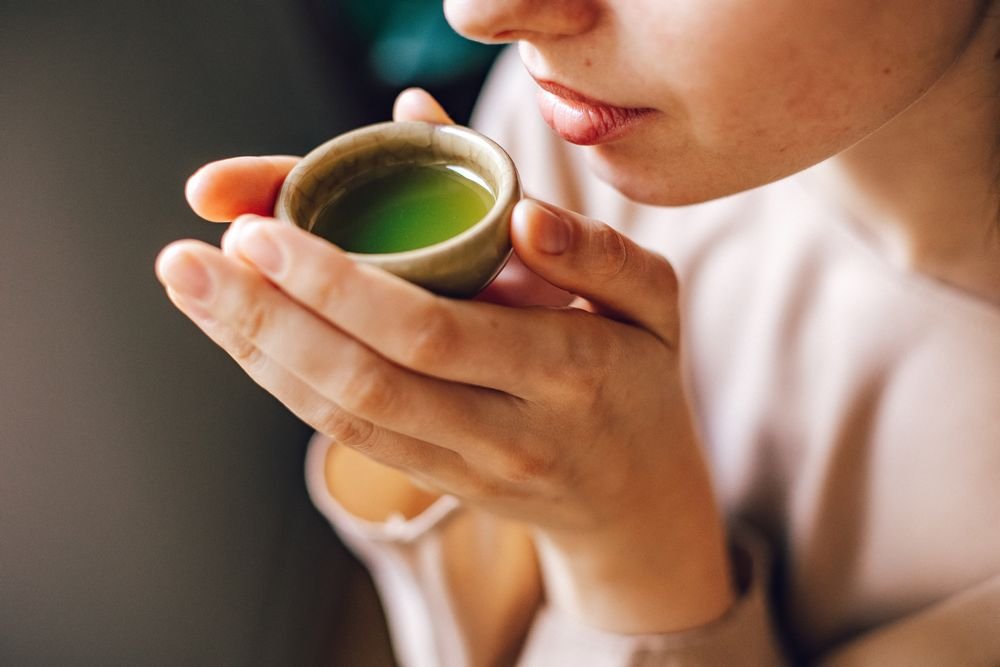
Both tea powders are derived from the leaves of their respective plants and they look similar. High-quality matcha and moringa tea powders are both green in color. Both teas are slightly bitter.
Used As Tea And Food
Both moringa and matcha are used as tea as well as for culinary purposes. Matcha is used for flavoring desserts, while moringa tastes better in savory items.
Aid In Weight Loss
Both teas are beneficial for weight loss. Moringa tea contains a lot of fiber, which keeps you full and suppresses the appetite. Matcha’s high antioxidant content boosts metabolism and encourages fat burning.
Protect The Liver
A study conducted in 2020 showed that matcha is beneficial for people with non-alcoholic fatty liver disease. It works by increasing liver enzyme levels.
Moringa tea has been shown to lower cholesterol and triglycerides. This lowers the inflammation of the liver in the case of non-alcoholic fatty liver disease.
Boost Heart Health

The antioxidants in matcha promote healthy blood flow and prevent blockages in the arteries. This can boost heart health.
Moringa contains quercetin, which prevents inflammation and lipid formation. It also lowers cholesterol and triglycerides, which can boost heart health.
Prevent Inflammation
Moringa contains isothiocyanates, which can lower chronic inflammation in the body. Matcha’s catechins and flavonoids also lower inflammation. Both teas have antibacterial and antifungal properties as well.
May Slow Down Aging
The EGCG antioxidant in matcha has several beauty benefits, because it prevents cell damage and reduces premature aging.
Moringa is often used as a beauty elixir. Its antioxidant cystine and vitamins C and E boost collagen and elastin and prevent wrinkles.
Reasons To Drink Matcha
Drink matcha if you want to feel calmly energized. Matcha contains L-theanine and caffeine, both of which moringa lacks. It also contains the antioxidant EGCG (epigallocatechin gallate), which is known for its numerous health benefits.
Matcha has an earthy, robust, bitter-sweet, and nutty flavor. It is the drink to choose for boosting heart and brain health, lowering inflammation, preventing cancer, and supporting weight loss.
Reasons To Drink Moringa
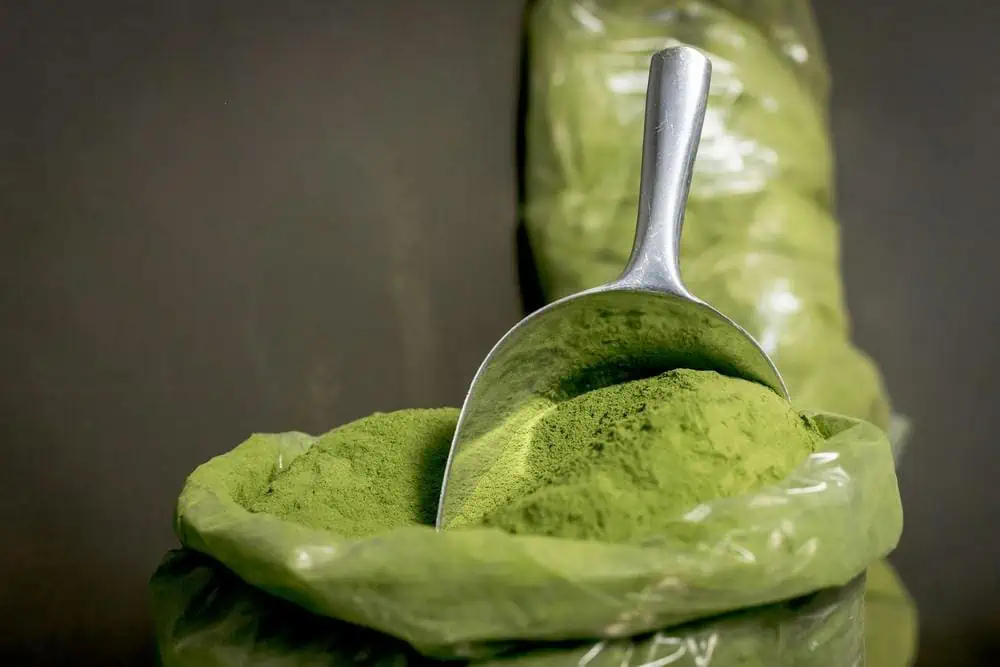
Moringa contains more fiber, protein, iron, calcium, and vitamin C than matcha. It is also caffeine-free and may be better for people looking to reduce their caffeine intake.
Moringa tea is usually cheaper than matcha. The latter is almost always sourced from Japan, whereas the former can grow in many climates. This makes moringa a better choice for those looking for a superfood on a budget.
Matcha Vs Moringa: Final Thoughts
As mentioned, in the introduction, I had never heard of moringa until recently, so I had someone familiar with both it and matcha write this article. And she did a good job.
Proofreading the article made me curious to try moringa and I have already placed an order for some. This is one of those times when a reader’s question teaches me something new. I love that! It has been an unexpected benefit of starting this site.
Hi-
The author wrote:
Calories 375 kcal 306 kcal
In my science world k stands for thousand
but I doubt that’s what the author meant.
Is it a typo, or something else?
Thank you.
Calorie and kcal are actually the same thing, for reasons too long to get into here. kcal is more common in Europe, where I have been living for the past few years. I guess I just got used to seeing it everywhere and have started using it myself.
Isn’t it amazing how readers expand our horizons? I’ve never tried moringa, but this comparison makes me want to try it with matcha. Discovering new tea flavors and health advantages is thrilling. Moringa may become a new fave!